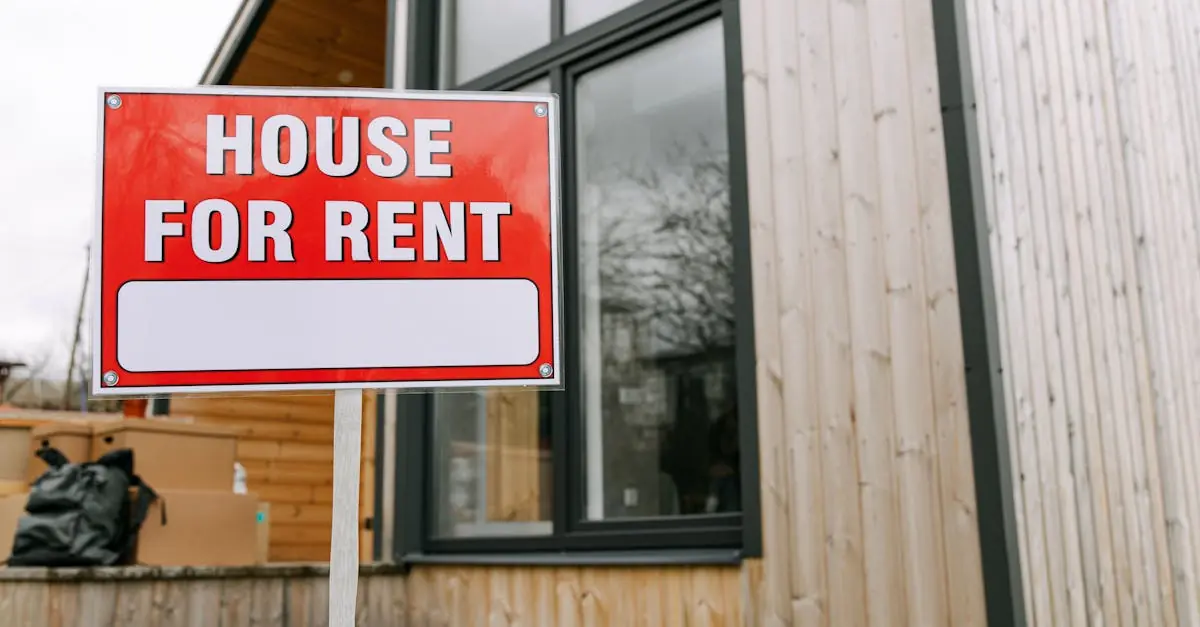Table of Contents
ToggleMaking the leap from tenant to landlord isn’t just about owning property—it’s a whole new mindset. Imagine trading in your “Where’s my deposit?” worries for thoughts like “How can I increase my property value?” It’s like going from being a guest at a party to hosting it yourself. Suddenly, every creaky floorboard and leaky faucet becomes a chance to flex your newfound skills.
Understanding the Tenant to Landlord Mindset
Transitioning from tenant to landlord requires an essential shift in perspective. This change moves focus from temporary concerns to long-term property goals.
Defining the Mindset Shift
Being a landlord involves embracing ownership responsibilities. Prioritizing property value becomes crucial, as does viewing repairs as opportunities rather than burdens. For instance, handling maintenance issues can enhance skills and contribute to increased property equity. Taking charge of decisions allows for strategic planning, ultimately leading to a successful rental business. Recognizing the potential for growth in this new role is vital.
Importance of Mindset Transition
The mindset transition influences overall success in property management. Shifting focus from personal comfort to financial investment creates proactive landlords. Emphasizing financial literacy becomes paramount, as understanding costs and returns directly affects profitability. Viewing challenges as learning experiences increases resilience and adaptability. Moreover, strong communication skills foster better relationships with tenants, enhancing rental experiences. Adopting this new mindset lays the groundwork for achieving sustainable property success.
Key Elements of the Landlord Mindset
Transitioning into the role of a landlord requires embracing specific key elements that contribute to successful property management.
Financial Literacy and Investment Knowledge
Understanding financial concepts significantly boosts a landlord’s ability to manage investments effectively. Familiarity with key metrics like cash flow, return on investment, and net operating income proves essential. It empowers landlords to analyze potential properties accurately, ensuring they make informed choices. Knowledge of local rental markets enhances pricing strategies, appealing to prospective tenants. Building expertise in property financing options, such as mortgages and equity, enhances decision-making capabilities. Additionally, awareness of tax implications for rental income aids in optimizing financial positions.
Risk Management and Decision-Making
Effective risk management forms the backbone of a landlord’s decision-making process. Identifying potential risks related to tenants, property maintenance, and market fluctuations enables proactive strategies. Developing a clear protocol for addressing tenant issues fosters stronger relationships and reduces disputes. Evaluating risk versus reward during property upgrades ensures that investments yield valuable returns. Keeping an emergency fund for unexpected repairs facilitates smoother operations. Through thorough research and analysis, landlords can cultivate confidence in their decisions, ultimately leading to greater long-term success.
Overcoming Common Challenges
Transitioning to a landlord mindset entails addressing various challenges. Tackling fear and uncertainty forms a crucial aspect of this journey.
Addressing Fear and Uncertainty
Managing fear and uncertainty requires an understanding of potential issues. Acknowledging that problems may arise, such as tenant disputes or property maintenance, helps in planning. Developing a proactive approach mitigates risks and enhances confidence. Landlords can benefit from connecting with networks or attending workshops focused on property management. Learning from experienced owners provides valuable insights, helping to reduce anxiety. Embracing a mindset of problem-solving empowers landlords to see challenges as opportunities for growth.
Building Confidence and Knowledge
Cultivating confidence and knowledge plays a vital role in successful property management. Landlords improve their effectiveness by gaining insights into local rental markets and financial literacy. Taking time to learn about cash flow, return on investment, and relevant regulations establishes a solid foundation. Engaging in continuous education through reading or online courses strengthens decision-making capabilities. Building a reliable support system creates a sense of security, reinforcing confidence in managing properties. Ultimately, informed decision-making leads to better outcomes and enhances overall landlord success.
Strategies for Developing a Landlord Mindset
Developing a landlord mindset requires intentional strategies that facilitate growth and understanding of property management. Focus on education, networking, and mentorship for substantial improvement.
Education and Continuous Learning
Continuous education aids in mastering the intricacies of property management. Landlords benefit from understanding cash flow, return on investment, and local market trends. Courses in real estate, property management, and finance enhance decision-making skills. Participating in online webinars or community workshops fosters knowledge retention and practical applications. Staying updated on housing laws and tenant rights protects both landlords and tenants. Reading books by experienced landlords or industry experts equips individuals with insights on best practices. Engaging with online real estate platforms allows for exploring various aspects of management and investment strategies.
Networking and Mentorship
Networking serves as a vital resource for new landlords seeking support. Connecting with other property owners creates a platform for sharing experiences and advice. Local real estate investment groups and meetups provide excellent venues for forming relationships. Seeking mentorship from seasoned landlords accelerates learning and skill development. Experienced mentors offer guidance on navigating challenges and identifying opportunities in property management. Building a reliable support system opens doors to collaborating on maintenance tasks and tenant solutions. Engaging with professionals, such as real estate agents and property managers, further solidifies understanding of market dynamics.
Conclusion
Transitioning from tenant to landlord marks a pivotal change in perspective. Embracing the responsibilities of property ownership opens doors to new opportunities for growth and skill development. By focusing on long-term goals and viewing challenges as chances to enhance knowledge, landlords can navigate the complexities of property management with confidence.
Investing in financial literacy and risk management is essential for making informed decisions. Building a robust support network and committing to continuous education will empower landlords to thrive in the rental market. As they cultivate a proactive mindset, they’ll not only improve their properties but also foster positive tenant relationships, ultimately leading to a successful and rewarding experience in property ownership.








